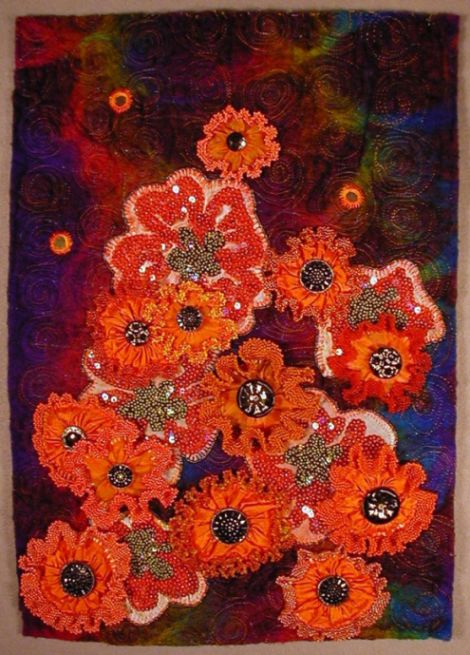|
Lest We Forget
John McCrae was born in Guelph, Ontario, in 1872. He served in the Boer War in 1899. He was part
of the artillery. Prior to WW1, he had a successful
medical practice. He was 41 years-old when he went to Europe.
The day before he wrote In Flanders' Field a good friend was killed. He was
buried in a simple grave where the poppies were already blooming among the wooden crosses.
Unfortunately McCrae himself was buried there after perishing from pneumonia
and meningitis, January 28th 1918. Unable to help his friend or other
fallen soldiers, John McCrae gave them a voice through "In Flanders Field."
In Flanders Fields
In Flanders fields the poppies blow
Between the crosses, row on row,
That mark
our place; and in the sky
The larks, still bravely singing, fly
Scarce heard amid the guns below.
We are the
Dead. Short days ago
We lived, felt dawn, saw sunset glow,
Loved, and were loved, and now we lie
In Flanders fields.
Take
up our quarrel with the foe:
To you from failing hands we throw
The torch; be yours to hold it high.
If
ye break faith with us who die
We shall not sleep, though poppies grow
In
Flanders Field
...Lt. Col.
John Macrae

PLEASE WEAR A POPPY
"Please wear a
poppy," the lady said
And held
one forth, but I shook my head.
Then I stopped and watched as she
offered them there,
And her face was
old and lined with care;
But
beneath the scars the years had made
There
remained a smile that refused to fade.
A boy came whistling
down the street,
Bouncing along on care-free feet.
His smile was full of joy and fun,
"Lady," said he, "may I have one?"
When she's pinned in on he turned to say,
"Why do we wear a poppy today?"
The lady
smiled in her wistful way
And answered, "This is Remembrance Day,
And the poppy there is the symbol for
The gallant men who died in war.
And
because they did, you and I are free -
That's why we wear a poppy, you see.
"I had a boy about your size,
With golden hair and big blue eyes.
He loved to play and jump and shout,
Free as a bird he would race about.
As the years went by he learned and grew
and became a man - as you will, too.
"He was fine and strong, with a boyish
smile,
But he'd seemed with us such
a little while
When
war broke out and he went away.
I still remember his face that day
When he smiled at me and said, Goodbye,
I'll be back soon, Mom, so please don't cry.
"But the war went on and he
had to stay,
And
all I could do was wait and pray.
His letters told of the awful fight,
(I can see it still in my dreams at night),
With
the tanks and guns and cruel barbed wire,
And
the mines and bullets, the bombs and fire.
"Till at last, at last, the
war was won-
And
that's why we wear a poppy son."
The small boy turned as if to go,
Then said, "Thanks, lady, I'm glad to know.
That sure did sound like an awful fight,
But your son - did he come back all right?"
A tear rolled down
each faded check;
She shook her head, but didn't speak.
I slunk away in a sort of shame,
And if
you were me you'd have done the same;
For our thanks, in giving, if oft delayed,
Thought our freedom was
bought - and thousands paid!
And
so when we see a poppy worn,
Let us reflect on the burden borne,
By those who gave their very all
When asked to answer their country's call
That we at home in peace might live.
Then wear a poppy! Remember - and give!
by Don Crawford
Moina Michael (American) is also the one who took the initiative to make
the poppy the symbol of remembrance. That happened on 9th November 1918, two days before the Armistice. On a meeting with
war-secretaries of the YMCA (Young Men's Christian Organisation) she decided to buy 25 poppies to be used at the upcoming
remembrance.
We shall keep the faith
Oh! You who sleep in Flanders' Fields
Sleep sweet - to rise anew;
We
caught the torch you threw,
And holding high we kept
The faith with those who died.
We cherish, too, the Poppy red
That grows on fields where valor led.
It
seems to signal to the skies
That blood of heroes never dies.
But lends a lustre to the red
On the flower that blooms
above the dead
In Flanders' fields.
And now the torch and Poppy red
Wear in honour of our dead.
Fear
not that ye have died for naught:
We've learned the lesson that ye taught
In Flanders' fields.
|

